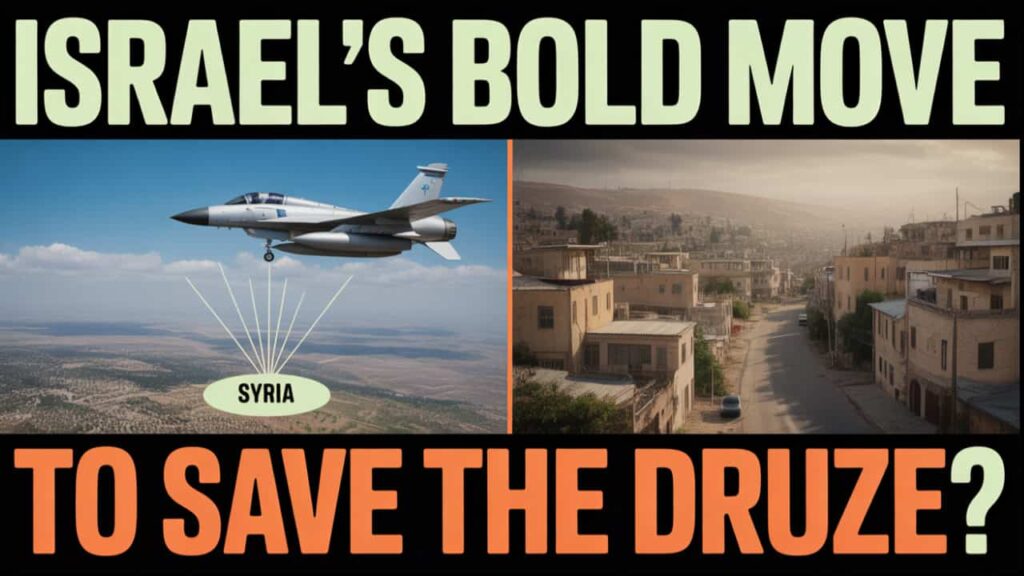The Israel Syria Druze conflict took a dramatic turn as Israeli warplanes launched powerful airstrikes on Damascus, targeting key Syrian government military installations. The strikes, which damaged the Defence Ministry and shook areas near the presidential palace, were described by Israeli officials as a direct response to violence against the Druze minority in southern Syria.
The Syrian province of Sweida, home to a significant Druze population, has been engulfed in deadly clashes between Druze militias, Syrian government forces, and armed Bedouin groups. More than 160 people have been killed in the past week alone, prompting Israel to act militarily in defense of the Druze community.
Table of Contents
🎯 The Trigger: Sweida Erupts Amid Minority Targeting
Tensions in Sweida escalated after multiple attacks against Druze civilians were attributed to Syrian regime forces and tribal militias loyal to the interim Islamist-led government of President Ahmed al-Sharaa. In what Israel views as a moral and strategic obligation, it launched airstrikes to deter further aggression and signal support for the Druze people.
“The Syrian regime is either complicit or negligent. We will continue operations in Sweida until Druze communities are safe,” declared Israeli Defense Minister Israel Katz.
📌 Airstrike Targets:
- Syrian Defence Ministry (partially destroyed)
- Military installation near the presidential palace
- Alleged operational bases threatening Druze areas
The Israeli military claims the targeted areas were being used to coordinate attacks on Druze communities. Syrian officials denounced the strikes as a “flagrant violation of sovereignty.”
⚠️ Reactions From the Region
The Israel Syria Druze conflict has triggered sharp political responses:
- Syrian Interim President Ahmed al-Sharaa accused Israel of fueling sectarian war.
- Israeli Druze citizens, in an emotional response, crossed the border to aid Syrian Druze despite official warnings.
- U.S. Secretary of State Marco Rubio called the situation “complicated,” suggesting diplomatic channels were being used to de-escalate.
Meanwhile, U.S. Syria Envoy Tom Barrack condemned violence in Sweida, urging “all parties to immediately halt hostilities and pursue a durable ceasefire.”
🧬 Understanding the Druze and Their Role in the Conflict
The Druze are a small but culturally significant religious minority spread across Syria, Lebanon, and Israel. In Syria, the community has traditionally remained neutral during the civil war, but that neutrality has increasingly been challenged.
In recent weeks, multiple sources, including the Syrian Network for Human Rights, reported mass executions, home burnings, and civilian casualties in Sweida. Israeli officials claim the Assad-linked military is failing to protect the Druze and may be cooperating with radical militias.
📉 Ceasefire Efforts and Their Collapse
A ceasefire was announced midweek by the Syrian Interior Ministry and Druze leader Sheikh Yousef Jarbou, but fighting resumed within hours. Another senior Druze figure, Sheikh Hikmat al-Hajari, rejected any peace unless Sweida is “entirely liberated from occupying forces.”
Sweida residents described a desperate situation:
“We are hiding in our homes. The sound of gunfire and shouting never stops. We’re trying to keep our children calm and quiet,” one resident told reporters anonymously.
The breakdown of ceasefires points to a longer, possibly ethnic-driven battle unfolding in southern Syria.
🔍 Strategic Implications of the Israel Syria Druze Conflict

The Israel Syria Druze conflict has wider ramifications for the Middle East. By directly intervening militarily in Syria, Israel is:
- Challenging the influence of Iran and Hezbollah, both of whom support the Syrian regime.
- Reinforcing its relationship with Israeli Druze, a community that serves in the IDF.
- Setting a precedent for cross-border intervention in defense of minority groups.
Military analysts warn that if the situation in Sweida continues to deteriorate, Israel may conduct more targeted operations, possibly even entering into direct skirmishes with Iranian-aligned militias operating in Syria.
🧭 Conclusion
The Israel Syria Druze conflict is far more than a local flare-up—it’s a convergence of minority rights, sectarian violence, and geopolitical power struggles. As Israel takes a bold stance to defend the Druze in Syria, the international community watches closely. Whether this leads to greater protection or a deeper regional war remains uncertain.
❓ Frequently Asked Questions (FAQ)
What is the Israel Syria Druze conflict?
It refers to the recent escalation involving Israeli military action in Syria, aimed at protecting the Druze minority from attacks by Syrian government forces and allied militias.
Who are the Druze?
The Druze are a religious and ethnic minority with a unique spiritual tradition, found mainly in Syria, Lebanon, and Israel.
Why did Israel bomb Damascus?
Israel launched airstrikes on Damascus in response to attacks against Druze civilians in the Syrian province of Sweida.
Has the international community responded?
Yes, the U.S. has called for calm, while human rights groups have condemned attacks on civilians. The situation remains volatile.
Could this lead to a wider war?
Yes. The involvement of Iran-backed forces and collapsing ceasefires in Sweida raise concerns of broader regional conflict.
👉 Stay informed on the unfolding crisis at www.documentarytimes.com